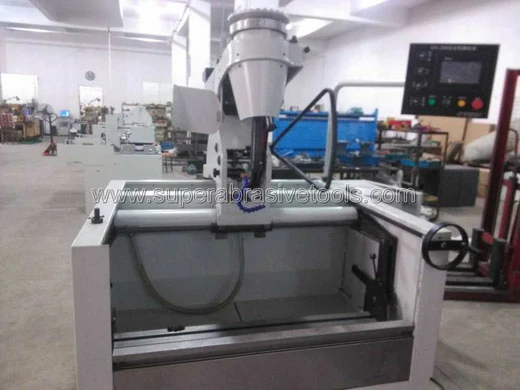Choosing the right grinding fluids for CBN (cubic boron nitride) wheels is crucial for achieving optimal performance and extending the operational life of the grinding wheel. CBN wheels are known for their exceptional hardness, thermal conductivity, and durability, making them a popular choice for grinding hardened steels, superalloys, and other challenging-to-machine materials. However, to fully leverage the benefits of CBN wheels, it’s essential to select the appropriate grinding fluid that complements the properties of the wheel and the specific requirements of the grinding process.
Understanding the Role of Grinding Fluids
Grinding fluids, also known as cutting fluids or coolant, play a multifaceted role in the grinding process. They serve several key functions, including reducing friction and heat generation, flushing away swarf (grinding debris), improving surface finish, and preventing workpiece and wheel damage. Additionally, grinding fluids can enhance the overall efficiency of the grinding operation by improving chip removal and maintaining dimensional accuracy. When it comes to CBN grinding wheels, the selection of the right grinding fluid becomes even more critical due to the unique characteristics of these superabrasive wheels.
Factors to Consider When Choosing Grinding Fluids for CBN Wheels
Several factors should be taken into account when selecting the most suitable grinding fluids for CBN wheels. These considerations encompass the compatibility of the fluid with CBN abrasives, thermal stability, lubrication properties, corrosion protection, environmental impact, and overall cost-effectiveness.
Thermal stability is a particularly crucial factor, as CBN wheels are often used in high-temperature grinding applications. The grinding fluid must possess exceptional heat dissipation capabilities to effectively control the thermal effects of grinding and prevent thermal damage to the workpiece and the wheel itself. Moreover, the lubricating properties of the fluid are vital for minimizing friction and wear on the CBN abrasive, ensuring consistent cutting performance and extending the wheel’s lifespan.
Corrosion protection is another significant consideration, especially when dealing with ferrous materials. The grinding fluid should offer effective corrosion inhibition to safeguard the workpiece and the grinding equipment from rust and other forms of corrosion. Environmental factors, such as the biodegradability and ecological impact of the fluid, also come into play, aligning with the growing emphasis on sustainable and eco-friendly manufacturing practices. Lastly, the overall cost-effectiveness of the grinding fluid, including factors like longevity, maintenance requirements, and potential for recycling, should be carefully evaluated to optimize operational efficiency.
Types of Grinding Fluids Suitable for CBN Wheels
A variety of grinding fluids can be employed with CBN wheels, each offering distinct advantages and considerations. Straight oils, also known as neat oils, are commonly used for grinding ferrous materials and provide excellent lubrication and cooling properties. However, they may require additional filtration and maintenance to ensure the removal of swarf and contaminants. Water-soluble fluids, including emulsions and synthetic coolants, are popular choices for CBN grinding due to their excellent cooling capabilities, cleanliness, and versatility across a wide range of materials. These fluids can be tailored to deliver specific performance attributes, such as enhanced lubrication, corrosion resistance, or bio-stability, depending on the application requirements.
Furthermore, semisynthetic fluids offer a balanced combination of mineral oil and water, providing improved lubrication and cooling while maintaining cleanliness and ease of use. Their versatility makes them suitable for various grinding operations involving CBN wheels. In addition to these traditional grinding fluids, minimum quantity lubrication (MQL) systems have gained traction for CBN grinding applications, offering significant reductions in fluid usage, waste generation, and environmental impact while providing adequate lubrication and cooling directly at the cutting zone.
In conclusion, choosing the right grinding fluids for CBN wheels is a critical decision that significantly influences the efficiency, quality, and cost-effectiveness of grinding operations. By carefully considering the properties and requirements of CBN abrasives, along with factors such as thermal stability, lubrication, corrosion protection, and environmental impact, manufacturers can optimize their grinding processes and maximize the performance and longevity of CBN wheels. With an array of grinding fluid options available, each with its own set of advantages and considerations, it’s essential to weigh the specific needs of the application to select the most suitable fluid for achieving superior results in CBN grinding operations.
.webp)
